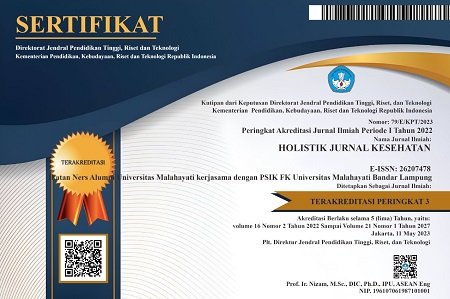Peristiwa kehidupan, aktivitas fisik, dan fungsi kognitif pada lansia di komunitas
Abstract
Background: Aging is a natural process that all individuals will face and it cannot be prevented. Someone who enters old age will face a process of change both physically, mentally, socially and spiritually. Decreased cognitive function can occur in older adults as they get older. However, decreased cognitive function can lead to Dementia problems. Adverse life events also can lead older adults have cognitive problems. Yet, being active physically can prevent older adults suffering problem in cognitive function.
Purpose: To examine the relationship between adverse life events, physical activity, and cognitive function in older adults dwelling in community.
Method: The research design used descriptive analytic with a cross-sectional approach. The total sample in this study was 93 older adults dwelling in community. This survey used questionnaires to measure adverse live events with Geriatric Adverse Live Events Scale (GALES), physical activity with International Physical Activity Questionnaire–Elderly (IPAQ-E), and cognitive function used Cognitive Impairment Test (6 CIT) questionnaire.
Results: The results of the Spearmen's rho correlation test were r = -0.294 for the physical activity variable and r = 0.454 for the life events variable with a significant value of p <0.05. This can be interpreted that there is a significant relationship between adverse life events and physical activity with cognitive function in older adults.
Conclusion: An older adult who experiences stress is very at risk of experiencing a decrease in cognitive function and this can lead to the emergence of dementia problems. Then the lower the physical activity carried out by older adults can trigger cognitive function problems.
Suggestion: It is hoped that families will routinely facilitate elderly people to carry out activities according to their abilities and conditions.
Keywords: Adverse Life Events; Cognitive Function; Older Adults; Physical Activity
Pendahuluan: Menua adalah proses alami yang akan dihadapi semua individu dan hal ini tidak dapat dicegah. Seseorang yang memasuki usia lanjut akan menghadapi proses perubahan baik pada fisik, jiwa, sosial dan spiritual. Masalah fungsi kognitif dapat terjadi pada lansia seiring dengan bertambahnya usia. Namun, penurunan fungsi kognitif dapat memicu terjadinya masalah Demensia. Peristiwa kehidupan yang tidak menyenangkan juga dapat berpengaruh terhadap masalah kognitif pada lansia. Namun, aktif secara fisik dapat mencegah lansia memiliki masalah fungsi kognitif.
Tujuan: Mengetahui hubungan peristiwa kehidupan, aktivitas fisik, dan fungsi kognitif pada lansia yang tinggal di komunitas.
Metode: Desain penelitian ini adalah deskriptif analitik yang menggunakan pendekatan cross-sectional. Total sampel pada penelitian ini berjumlah 93 orang lansia yang tinggal di komunitas. Penelitian ini menggunakan kuesioner Geriatric Adverse Live Events Scale (GALES) untuk menilai peristiwa kehidupan pada lansia, Physical Activity Questionnaire–Elderly (IPAQ-E) untuk menilai aktivitas fisik, dan Cognitive Impairment Test (6 CIT) untuk menilai fungsi kognitif pada lansia.
Hasil: Hasil uji korelasi spearmen’s rho adalah sebesar r = -0,294 untuk variable aktivitas fisik dan r = 0,454 untuk variable peristiwa kehidupan dengan nilai significance p <0,05. Hal ini dapat diartikan bahwa terdapat hubungan yang signifikan antara aktivitas fisik dan peristiwa kehidupan dengan fungsi kognitif pada lansia.
Simpulan: Seorang lansia yang mengalami stress sangat beresiko mengalami penurunan fungsi kognitif dan hal itu dapat mengarah munculnya masalah dementia. Kemudian semakin rendah aktivitas fisik yang dilakukan oleh lansia dapat memicu munculnya masalah fungsi kognitif.
Saran: Diharapkan keluarga dengan rutin memfasilitasi lansia untuk melakukan aktivitas sesuai dengan kemampuan dan kondisinya.
Keywords
References
Agustia, S., Sabrian, F., & Woferst, R. (2014). Hubungan Gaya Hidup dengan Fungsi Kognitif pada Lansia. Jurnal Online Mahasiswa, 1(2), 1-8.
Aini, D. N., & Puspitasari, W. (2016). Hubungan Fungsi Kognitif dengan Kualitas Hidup pada Lansia di Kelurahan Barusari Kecamatan Semarang Selatan. 7(1), 6-12.
Anugrahanti, W. W., Marbun, R., & Putri, N. O. (2020). The Relationship Between Physical Activities and Cognitive Function. NurseLine Journal, 5(2), 267-272.
Apostolo, J. L. A., Paiva, D. D. S., Silva, R., Santos, E., & Schultz, T. J. (2018). Adaptation and validation into Portuguese language of the six-item cognitive impairment test (6CIT). Aging Ment Health, 22(9), 1184-1189. doi:10.1080/13607863.2017.1348473
Cahyaningrum, E. D. (2022). Hubungan aktivitas fisik dengan fungsi kognitif lansia. Jurnal Surya Muda, 4(1), 27-36.
Castanho, T. C., Santos, N. C., Meleiro-Neves, C., Neto, S., Moura, G. R., Santos, M. A., &. Sousa, N. (2021). Association of positive and negative life events with cognitive performance and psychological status in late life: A cross-sectional study in Northern Portugal. Aging Brain, 1, 100020. doi:10.1016/j.nbas.2021.100020
Devanand, D. P., Kim, M. K., Paykina, N., & Sackeim, H. A. (2002). Adverse Life Events in Elderly Patients With Major Depression or Dysthymic Disorder and in Healthy-Control Subjects. The American Journal of Geriatric Psychiatry, 10(3), 265-274. doi:10.1097/00019442-200205000-00005
Dong, G. C., & Li, M. (2021). Stressful Life Events and Late-Life Cognitive Function in Community-Dwelling Chinese Older Adults: Findings from a Population-Based Cohort Study in the Greater Chicago Area. Journal of Ageing and Longevity, 1(1), 24-35. doi:10.3390/jal1010004
Hurtig-Wennlof, A., Hagstromer, M., & Olsson, L. A. (2010). The International Physical Activity Questionnaire modified for the elderly: aspects of validity and feasibility. Public Health Nutr, 13(11), 1847-1854. doi:10.1017/S1368980010000157
Khanna, A. B., & Metgud, C. S. (2020). Prevalence of cognitive impairment in elderly population residing in an urban area of Belagavi. J Family Med Prim Care, 9(6), 2699-2703. doi:10.4103/jfmpc.jfmpc_240_20
Kirk-Sanchez, N. J., & McGough, E. L. (2014). Physical exercise and cognitive performance in the elderly: current perspectives. Clin Interv Aging, 9, 51-62. doi:10.2147/CIA.S39506
Koyanagi, A., Oh, H., Vancampfort, D., Carvalho, A. F., Veronese, N., Stubbs, B., & Lara, E. (2019). Perceived Stress and Mild Cognitive Impairment among 32,715 Community-Dwelling Older Adults across Six Low- and Middle-Income Countries. Gerontology, 65(2), 155-163. doi:10.1159/000492177
Larasati, A. N., & Boy, E. (2019). The Impact of Physical Activity in Elderly. Magna Medica, 6(2), 113-121.
Manurung, C. H., Karema, W., & Maja, J. (2016). Gambaran fungsi kognitif pada lansia di Desa Koka Kecamatan Tombulu. Jurnal e-Clinic (eCl), 4(2).
National Institute on Aging. (2020). Cognitive Health and Older Adults. Cognitive Health Retrieved from https://www.nia.nih.gov/health/cognitive-health-and-older-adults
Nilaweera, D., Gurvich, C., Freak-Poli, R., Woods, R., Owen, A., Murray, A., & Ryan, J. (2023). Adverse events in older adults and the risk of dementia and cognitive decline. J Affect Disord Rep, 13. doi:10.1016/j.jadr.2023.100592
Nisa, O. S., & Jadmiko, A. W. (2019). Hubungan Tingkat Aktifitas Fisik dengan Fungsi Kognitif pada Lanjut Usia. Jurnal Berita Ilmu Keperawatan, 12(2), 59-64.
Noor, C. A., & Merijanti, L. T. (2020). Hubungan antara aktivitas fisik dengan fungsi kognitif pada lansia. Jurnal Biomedika dan Kesehatan, 3(1), 8-14. doi:10.18051/JBiomedKes.2020.v3.8-14
Palit, I. D., Kandou, G. D., & Kaunang, W. J. P. (2021). Hubungan antara Aktivitas Fisik dengan Kualitas Hidup pada Lansia di Desa Salurang Kecamatan Tabukan Selatan Tengah Kabupaten Kepulauan Sangihe. Jurnal Kesmas, 10(6), 93-100.
Praesti, W. (2014). Peristiwa kehidupan, lokus kendali, dan depresi pada lansia. Jurnal Sains dan Praktik Psikologi 2(3), 268-277.
Saputri, N. D., Susanto, T., & Susumaningrum, L. A. (2020). Association between Cognitive Function and Quality of Life in Aged People in an Elderly Home. Revista Cubana de Enfermería, 3(6), 1-13.
Sauliyusta, M., & Rekawati, E. (2016). Aktivitas fisik memengaruhi fungsi kognitif lansia. Jurnal Keperawatan Indonesia, 19(2), 71-74.
Sesar, D. M., Fakhrurrazy, F., & Panghiyangani, R. (2019). Hubungan Tingkat Aktivitas Fisik dengan Fungsi Kognitif pada Lansia di Panti Sosial Tresna Wredha Kalimantan Selatan. Mutiara Medika: Jurnal Kedokteran dan Kesehatan, 19(1). doi:10.18196/mm.190125
Simonyte, S., Grabauskyte, I., Macijauskiene, J., Lesauskaite, V., Lesauskaite, V., Kvaal, K. S., & Stewart, R. (2023). Associations of the serotonin transporter gene polymorphism, 5-HTTLPR, and adverse life events with late life depression in the elderly Lithuanian population. Sci Rep, 13(1), 12920. doi:10.1038/s41598-023-40215-4
Tschanz, J. T., Pfister, R., Wanzek, J., Corcoran, C., Smith, K., Tschanz, B. T., & Norton, M. C. (2013). Stressful life events and cognitive decline in late life: moderation by education and age. The Cache County Study. Int J Geriatr Psychiatry, 28(8), 821-830. doi:10.1002/gps.3888
World Health Organization. (2020). Physical activity. Fact sheets. Retrieved from https://www.who.int/news-room/fact-sheets/detail/physical-activity
Xia, Y., Wang, G., Xiao, L., Du, Y., Lin, S., Nan, C., & Weng, S. (2023). Effects of Early Adverse Life Events on Depression and Cognitive Performance from the Perspective of the Heart-Brain Axis. Brain Sciences, 13(8). doi:10.3390/brainsci13081174
Zaliavani, I., Anissa, M., & Sjaff, F. (2019). Hubungan Gangguan Fungsi Kognitif Dengan Kejadian Depresi Pada Lansia Di Posyandu Lansia Ikur Koto Wilayah Kerja Puskesmas Ikur Koto Kota Padang. Health & Medical Journal, 1(1), 30-37.
DOI: https://doi.org/10.33024/hjk.v17i5.11960
Refbacks
- There are currently no refbacks.
Copyright (c) 2023 Holistik Jurnal Kesehatan

This work is licensed under a Creative Commons Attribution-NonCommercial 4.0 International License.














